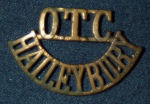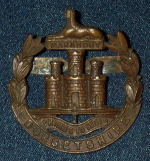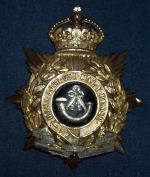Summary of his roles in World War I - by Edward Packe
I had six months in France as a Private Soldier in a pre-war Regular Battalion and six months as an Officer. I had six months in France as an Observer in the Royal Flying Corps and nine months as a Pilot. I had therefore a very comprehensive picture of that war, particularly so since I was mostly flying over ground which I knew intimately from my time in the trenches.I am therefore setting down my impressions of service in the various grades in which I served:
|
Private Soldier Officer Observer (Royal Flying Corps) Fighter Pilot |
 |
| O.T.C. Haileybury (Officer Training Corps, public school organisation) |
Private Soldier
I enlisted for a variety of reasons and chose the 1st Somerset Light Infantry because theirs was the nearest Barracks to my home. My eldest brother had been commissioned in the Royal Fusiliers for some years so I knew something about the Army, and I had served four years in the O.T.C. I was a Marksman and I was physically very fit. War had been declared and I asked to be taken to France with the Battalion before enlisting which was agreed to by the Commanding Officer who no doubt thought that I should be unable to stand up to the rigours of a route march.Discipline was exceedingly strict but there existed tremendous pride of unit amongst the men, not only for the Regiment but also for their own Platoon. Food was plentiful but unappetising.
The soldier carried, in Field Service Marching Order, rifle and bayonet, 120 rounds of ammunition, pack and haversack, entrenching tool, water bottle. Carried in the pack was a greatcoat, spare shirt, socks, canteen, canvas shoes, holdall, housewife. Emergency rations were carried in the haversack, plus any private possessions and the so-called Cap Comforter and cardigan. This considerable weight was carried at all times including into battle. Later on in the war, packs were stacked and not carried in battle.
 Regimental Cap and Shoulder badge of the Somerset Light Infantry, where E.A.P. enlisted as a private |
The men had the greatest respect for their Officers but these so quickly became casualties; at one time we had no Officers in our Company until after a week or two the Transport Officer took over the Company.
I can only think of one criticism and that is that the men were never told anything, but this may have been that the officers themselves were not told until too late to pass the information on.
For the first three weeks in France food was very scarce and I remember eating a raw swede or rather trying to, but once we settled down to trench warfare it became plentiful. The rum ration and the Mail became the great features of the day.
The Germans were our enemies, but worse than them the continual mud which plastered everything. On top of this, our Artillery were pitifully short of ammunition and the infantry had to endure the German shells without getting any retaliation from our own guns and this is very demoralising.
I must add that from the first I was received with the very greatest kindness by the men, and with consideration by the Officers and N.C.O.s, even if I was put on a charge for having a dirty rifle during the retreat from Mons.
The Pre-war soldier had little to learn. He had to be fit and keep himself and his kit immaculate. He had to know his Drill and be able to use his Rifle and Bayonet and he had to do what he was told instantly.
In battle when he left his trench to charge across No Man's Land, he had a comrade on either side of him and was preceded by his Officer.
 Dorsetshire regiment badge, where E.A.P. served as an officer |
An Officer
An officer was expected to be an example to his men at all times and in all things, sharing not only their hardships but their amusements. He must see his men have their food before he himself eats and he must not wear a coat when his men do not. He must win their confidence and listen to any problems that may beset them.He does not carry so much equipment as the soldier, but he has to see to the comfort of the men when they get into billets and to return and inspect their feet and rifles after a long march. In short, the soldier has only himself to think of, the officer has do the best he can for his men before he begins to think of himself.
In battle the Officer has to lead his men and can only hope that they are following him across that stretch of No Man's Land for he has no one on either side of him, but if he has inspired their confidence in the time preceding the charge, he will have no grounds for fear on that score.
An Observer
 Royal Flying Corps cap badge and buttons |
It must be remembered that the aircraft were made of wood, had no brakes or flaps, and were not supplied with parachutes or oxygen, and the cockpits were not enclosed and the earlier engines were all rotary, and under these conditions I have done a patrol at over 17,000 ft of two hours duration when there snow on the ground.
My time as an observer was on B.E.2.C.s and my cockpit was in front of the pilot's. I had a Lewis gun shooting back over the pilot's head, he had another Lewis fixed at an angle big enough to miss the tips of the propeller.
For an Observer to be awarded his badge he had to have done two successful reconnaissances, have had a scrap in the air, and to have two successful shoots with the Artillery. He also had to pass tests on Morse and on the Lewis and Vickers guns. An Observer could only get his badge in battle.
The duties a two seater squadron was called upon to perform were long reconnaissance over the Lines to report on rail and road movement. Line reconnaissance to report on Artillery positions and new trench works. Photography, shoots with the Artillery, and Contact Patrol with the infantry during a battle. With the exception of Photography, all these duties were carried out by the Observer, the pilot being merely the chauffeur.
Long reconnaissance was carried out at 8,000 ft and usually lasted about three and half hours. Contact Patrol was at from 2,000 ft to 1,500 ft, and the other duties at any convenient height. Not more than one Long Reconnaissance was called for in a day, but with the other jobs six or seven hours flying a day was not uncommon.
Fighter Pilot
 Royal Flying Corps "Wings" and a pilot identity disc made from a crown coin |
During Paschendaele there were three layers of fighters during some periods of the day, ourselves, 32 Squadron, because we were about the slowest aircraft in the sky, were kept close to the line with a ceiling of three thousand feet; we patrolled from dawn to duck in pairs, relieving each other on the line. Our duties were to attack the Hun two-seater machines and protect our own from the onslaughts of Richthoven and Boelke with their circuses of from eight to sixteen machines. Above us were patrols of eight machines who made sweeps over the German lines around six times a day at heights of 8,000 ft. Above them again were patrols of twelve to sixteen machines at around 15,000 ft going further over the lines probably two or three times a day.
The result of these activities was very marked. Leaving one's aerodrome and flying towards the lines at around 2,000ft one could see camps, parks, horse lines, dumps, etc. and on all the main roads was a continuous stream of two-way traffic right up to the point where the roads became visible from the German trenches. Crossing the lines at the same height, one could go five or six miles into German territory, without seeing any sign of life at all, except of course for the numerous tracks. The difference between the two was so marked that one could call our side the 'Living', and the German side the 'Dead'. How the Germans managed it I do not know, but I believe they were forced to use good and very extensive camouflage, and nearly all movement was confined to the hours of darkness.
I remember feeling a sense of personal insult at seeing German aircraft within five miles of the line, but as they were unwilling to accept combat unless the odds were three to one in their favour, and as their machines were faster than ours, it was difficult to bring them to book.
On our side of the lines camouflage was very little, or very badly made use of. Every open space seemed filled with the paraphernalia of war. I used to think that a German pilot could fly over at night and drop his bombs blind, yet be confident of doing some damage.
I met Immelmann, Boelke, and Richthoven in the air and they were all good fighters and very different to the usual run of German pilots; towards the end of the war the Germans were getting very short of material, being blockaded, and their pilots were ordered not to accept battle unless the outcome was a certain victory.

